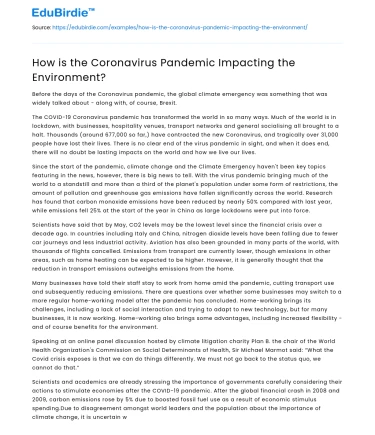Before the days of the Coronavirus pandemic, the global climate emergency was something that was widely talked about - along with, of course, Brexit.
The COVID-19 Coronavirus pandemic has transformed the world in so many ways. Much of the world is in lockdown, with businesses, hospitality venues, transport networks and general socialising all brought to a halt. Thousands (around 677,000 so far,) have contracted the new Coronavirus, and tragically over 31,000 people have lost their lives. There is no clear end of the virus pandemic in sight, and when it does end, there will no doubt be lasting impacts on the world and how we live our lives.
Save your time!
We can take care of your essay
- Proper editing and formatting
- Free revision, title page, and bibliography
- Flexible prices and money-back guarantee
Since the start of the pandemic, climate change and the Climate Emergency haven't been key topics featuring in the news, however, there is big news to tell. With the virus pandemic bringing much of the world to a standstill and more than a third of the planet's population under some form of restrictions, the amount of pollution and greenhouse gas emissions have fallen significantly across the world. Research has found that carbon monoxide emissions have been reduced by nearly 50% compared with last year, while emissions fell 25% at the start of the year in China as large lockdowns were put into force.
Scientists have said that by May, CO2 levels may be the lowest level since the financial crisis over a decade ago. In countries including Italy and China, nitrogen dioxide levels have been falling due to fewer car journeys and less industrial activity. Aviation has also been grounded in many parts of the world, with thousands of flights cancelled. Emissions from transport are currently lower, though emissions in other areas, such as home heating can be expected to be higher. However, it is generally thought that the reduction in transport emissions outweighs emissions from the home.
Many businesses have told their staff stay to work from home amid the pandemic, cutting transport use and subsequently reducing emissions. There are questions over whether some businesses may switch to a more regular home-working model after the pandemic has concluded. Home-working brings its challenges, including a lack of social interaction and trying to adapt to new technology, but for many businesses, it is now working. Home-working also brings some advantages, including increased flexibility - and of course benefits for the environment.
Speaking at an online panel discussion hosted by climate litigation charity Plan B. the chair of the World Health Organization's Commission on Social Determinants of Health, Sir Michael Marmot said: “What the Covid crisis exposes is that we can do things differently. We must not go back to the status quo, we cannot do that.”
Scientists and academics are already stressing the importance of governments carefully considering their actions to stimulate economies after the COVID-19 pandemic. After the global financial crash in 2008 and 2009, carbon emissions rose by 5% due to boosted fossil fuel use as a result of economic stimulus spending.Due to disagreement amongst world leaders and the population about the importance of climate change, it is uncertain whether future economic decisions will seriously consider the environment. It can also be questioned what impact the COVID-19 pandemic will have on the attainment of climate goals that have already been set, such as reaching net-zero emissions by 2050 in the UK and banning the sale of petrol and diesel cars in the UK by 2035. On the one hand, the current pandemic may help the attainment of these targets are the rise in emissions slows, however, decisions made after the pandemic could potentially counteract the lower levels of emissions achieved in recent months.
In difficult times of constant bad news, there is positive news on the climate front - however, key decisions in the future will be crucial in determining whether this more positive news can continue.






 Stuck on your essay?
Stuck on your essay?

